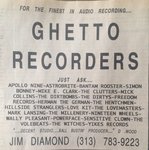


Since the onset of blues, pop and rock ’n roll, Michigan has been internationally known and lauded for its musical output. Just like we’re an automotive state, we’re also a music state – and it’s not just one kind of music. Michigan’s sonic universe spans all genres, and we’ve done them all well.
But it’s not just about the musicians. It’s also about the studios where the melodies were laid down. And it’s not just about the iconic rooms like United Sound Systems and Motown Studios, there are dozens of other recording facilities that’ve become widely known for etching out their own distinct sound. A record cut in Michigan often has a Michigan sound. It’s hard to describe, but you know it when you hear it.
One of those facilities was Ghetto Recorders in Detroit. While it ceased operations in 2014, prior to that, the room drew bands from not only across the state, but from across the world. For 18 years, the man behind the board was Lansing-area native Jim Diamond, who continues to produce to this day. Diamond also spent years playing bass in The Wayouts and The Dirtbombs.
Back in his Ghetto Recorders heyday (’90s through the mid-'00s), he engineered records for The White Stripes and countless other then-emerging rock bands. All of them recorded on two-inch tape with vintage machines. When I spoke with Diamond back in 2007, the Trenton-born producer told me how a job at Harvest Productions (a Lansing fixture) led him into forming his own business.
“I was at Harvest in 1995, and I think I was about to turn 30,” Diamond said. “I did a lot of car commercials and Christian metal. That’s when I said to myself, ‘What the hell are you doing here? There’s got to be something more.’ So, I quit and moved in with my parents at age 30. They live in a suburb of Detroit, and started calling studios in the area trying to get my foot in the door to do some freelance engineering. An old friend, John Linardos, lived downtown and had a huge loft apartment space and a little 8-track recording setup. I ended up moving in with him after over a year with my parents and that’s where Ghetto Recorders is today.”
After things got cooking at the studio, Lansing’s own garage-punk duo Bantam Rooster christened the room. Led by vocalist/guitarist Tom Potter, the pair would be the first to lay down tracks at the makeshift analog studio.
“I knew Tom back in 1994,” Diamond recalled. “He had a band in Lansing, Michigan where we both lived at the time. It was called Kill Devil Hill — a three-piece. I recorded them at this studio I worked at back then called Harvest Productions. But Bantam Rooster was the first official release from Ghetto Recorders.”
Another group that recorded at Ghetto Recorders was (my favorite band) The Compulsive Gamblers. The Memphis band rolled into town primarily to play as a back-up band for Detroit R&B legend Andre Williams—but the band also decided to cut a record with Diamond while they were in the Motor City. The LP, “Crystal Gazing Luck Amazing” was issued in 2000 by Sympathy For the Record Industry.
Led by Greg Cartwright and Jack Yarber (who also front The Oblivians), the band of Memphians also picked up Michigan musicians Dale Beavers and Jeff Meier to play on “Crystal Gazing.” The result? A soulful explosion of garage-rock masterpieces. Google “Stop and Think It Over” to hear some of the magic Diamond caught on tape.
“I loved making that record,” Diamond recalled. “Most of it was done live. Greg sang through this crappy PA system I had, but he was such a good singer. It was a lot of fun and I think we did it in four or five days.”
Like the now-demolished Ghetto Recorders, the Compulsive Gamblers have also folded. Luckily, they all left behind those reels of tape before they did.
1 comment on this item Please log in to comment by clicking here
Support City Pulse - Donate Today!
Other items that may interest you

Mark68
Great piece, Rich! I like all your articles about the Lansing music scene and its history.
Tuesday, January 26, 2021 Report this